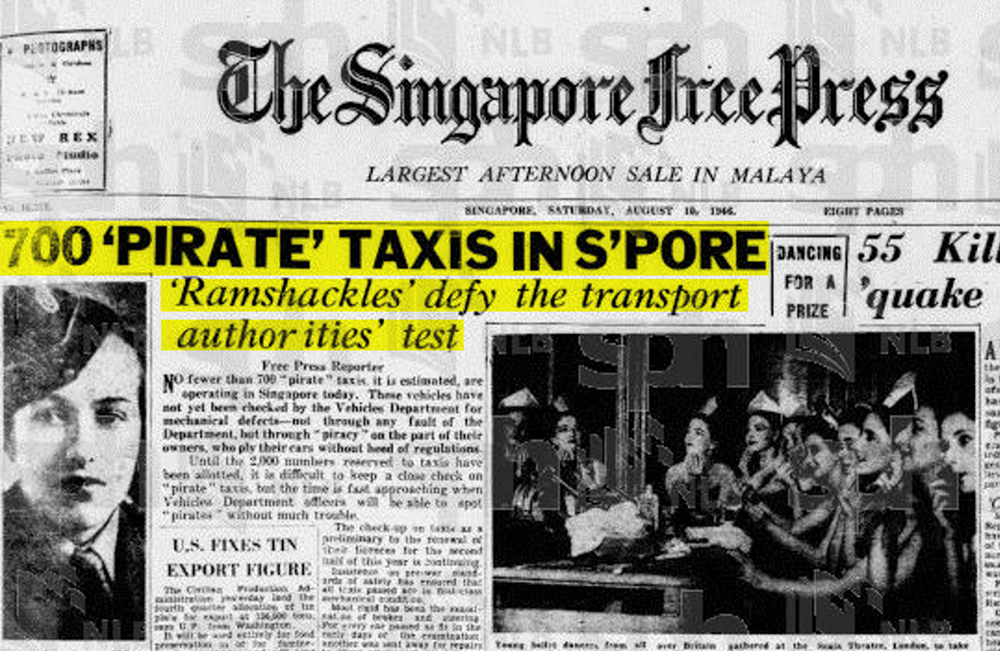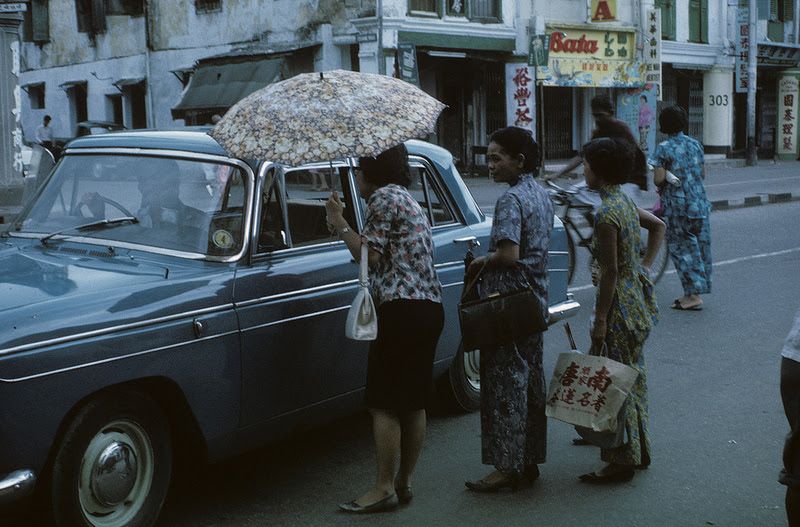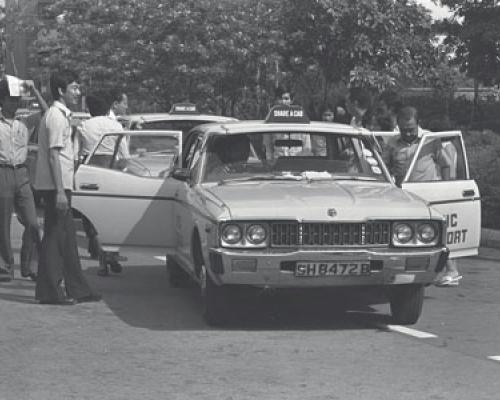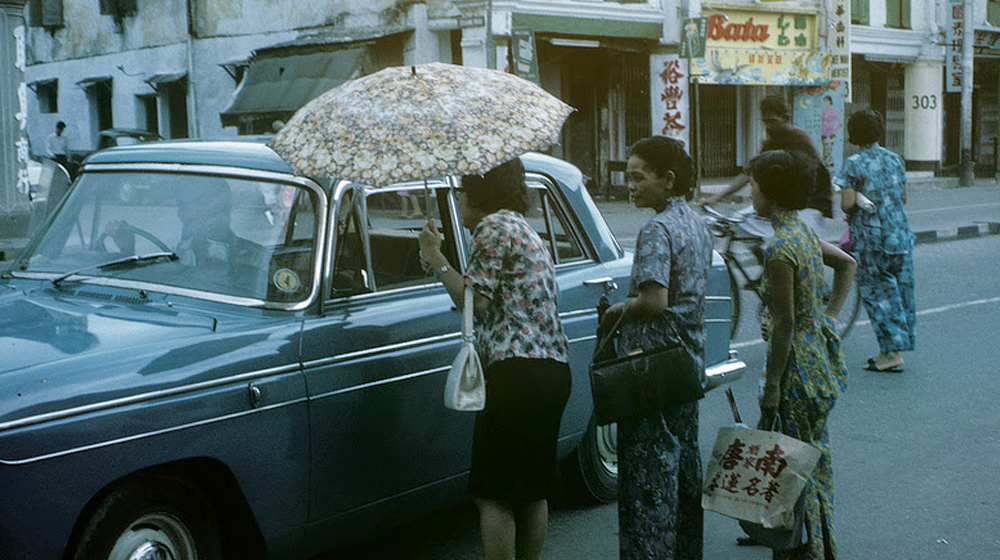In the age of disruptive innovation, the likes of Uber and Grab seems fresh and new.
However, to folks who have lived a little longer here, the proliferation of private-hire car services bears an uncanny resemblance to the season where pirate taxis ruled the streets.
 10 August 1946 headline in The Singapore Free Press. Image via NewspaperSG.
10 August 1946 headline in The Singapore Free Press. Image via NewspaperSG.
Ahoy ah?
The first licenced taxis appeared on our streets in the 1940s. By the 1950s, taxi fares were determined by metered rates.
At the same time, because of deteriorating bus services, pirate taxis came in to fill the void - getting one from point A to point B via taxi, based on a competitive negotiated rate.
 Image via singas.co.uk
Image via singas.co.uk
"During that time, it could be said that our entire transport facilities had come to a stop," said the late legislative assemblyman, Lim Cher Kheng, "and that the pirate taxis then rendered a valuable service".
“[Pirate taxis] is created by our bad transport system. If our transport system had been good and if it had been convenient for everybody to travel by this means to their places of employment and homes, pirate taxis cannot exist."
- Lim Choon Mong, 1957 (during the debate on the Road Traffic (Amendment) Bill).
 Taxi fleet on North Bridge Road in 1968. Image via National Archives.
Taxi fleet on North Bridge Road in 1968. Image via National Archives.
[related_story]
There were no rules - basically anything went. Anyone could be a pirate taxi driver as long as you had a car.
As a commuter, you could had control over how much you wanted to pay and when you wanted to get a taxi.
"I remember the driver wouldn’t start the trip until the car was full. Sometimes, the car could have up to seven passengers riding inside. The more passengers, the lower the fare you had to pay."
- Eunice Lee, 58 year-old housewife.
Taxi fares were cheap - not just because commuters could split the fare among many passengers - but also because without having to pay for the licencing fees, pirate taxi drivers could charge lesser for the trip.
"For example, I took three trips, one from Robinson Road to Alexandra Road, for which I paid 50 cents; from Bras Basah Road to Serangoon Road, I paid 70 cents, and from Changi Market to Changi Point, I paid 50 cents. I think it was a wonderful service to the public during that period.
- Lim Cher Kheng, 1957 (during the debate on the Road Traffic (Amendment) Bill)
In the same debate, Lim also highlighted how pirate taxis were a godsend for those living in the rural kampongs, and couldn't get prompt access to licenced taxis.
End of the road
Due to frequent labour and union strikes in Singapore during the 1950s and 1960s that often paralysed the bus system, pirate taxis flourished during that period.
According to a report by transport company STC in 1966, there was an estimated 12,000 pirate taxis plying the roads illegally, which took away about 6.7 million fares from the company in 1965. This resulted in the company losing about $1 million in revenue.
Apart from lost revenue, pirate taxis also present a problem, due to safety issues regarding their passengers. Essentially, passengers were not covered by insurance if an accident occurred.
To counter the pirate taxi problem, NTUC formed the Workers' Co-operative Commonwealth for Transport in 1970 with a fleet of 1,000 taxis, which would later become NTUC-Comfort and progress on over the years to become present day ComfortDelGro.
Further measures were also adopted by the government in 1970 to fix the pirate taxi problem. A white paper on the Reorganisation of Motor Transport Service of Singapore was published, which recommended government regulations to curb the problem, including stricter enforcement measures and the 100 per cent increase in diesel taxes for private diesel vehicles.
The successfully adopted measures caused the problem of pirate taxis to be eradicated, with many pirate taxis drivers choosing to switch to the licenced taxis under NTUC-Comfort or take up jobs such as bus drivers or conductors.
 Singapore taxi in 1983. Image via Remember Singapore.
Singapore taxi in 1983. Image via Remember Singapore.
Fast forward to 2017 and the pirate taxis have been replaced by a new kind of 'disruptive' transport: Private-hire car services such as Uber and Grab.
From July this year, private-hire car drivers are required to attain a vocational licence - an attempt by the authorities to level the playing ground.
More recently, transportation company ComfortDelGro is attempting to set up more roadblocks for private-hire car services by preventing them from calling at taxi stands. Only licenced taxis can pick up passengers at taxi stands in Singapore.
It seems like history has repeated itself - but this time, the 'pirate taxis' of today might be winning the battle on our roads.
Top photo adapted from www.singas.co.uk.
1819 is a labour of love by Mothership.sg where we tell stories from Singapore’s history, heritage & culture. Follow us on Facebook, Instagram and Twitter!
If you like what you read, follow us on Facebook, Instagram, Twitter and Telegram to get the latest updates.
